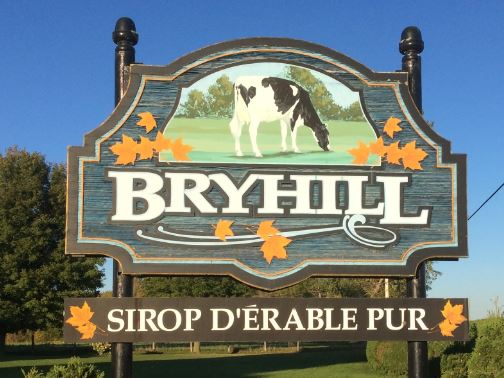Bryhill Farms: A Passion for Dairy

Operating one of the biggest dairy farms in the Chateauguay Valley, the family-run Bryhill Farms strives for both excellence and a sense of community.
Born to a family of seven, William Bryson did not inherit his family homestead, driving him to begin his own business. Having grown up on a farm that was predominately dairy, Bryson chose to work with dairy cows, hoping to establish a business for his own children, should they wish to pursue a career in dairy. Together with his wife Lynn, Bryson established Bryhill Farms—an operation that presently makes up one of the largest dairy farms in the Chateauguay Valley. Located in Ormstown, Quebec, Bryhill Farms is home to approximately 350 milking dairy cattle at any given time.
Currently operated by two sons of the late William Bryson, David and Matthew have modernized the business. (Bryson had four sons, two of which pursued other interests, albeit in agricultural fields.) The entire farm, which is impeccably kept, is geared for efficiency. The comfort of the cattle is a priority, with four buildings dedicated to housing cows within their different stages. The farm, like any dairy farm in Canada, adheres to very strict levels of quality control, put forth by the Canadian government in order to maintain the highest quality of dairy product.
Today, Bryhill Farms is run by the entire Bryson family—with every family member working in some capacity on the farm. With seven additional employees, the farm also aims to hire locally in order to contribute to the community—something that has been quite a challenge for the farm. According to Matthew Bryson, “Supporting the local people is important for us, but it can be difficult. We’ve been very lucky to find some very good help, but that is not always the case.”
Staffing isn’t the only issue that Matthew is worried about. One of the biggest issues facing dairy farmers today is the potential passing of the Trans-Pacific Partnership, a proposed trade agreement involving several countries considered within the Pacific Rim. In order to pass the agreement, Canada may be willing to consider the importation of up to 10% of American dairy products into our current market—a consideration that has left Canada’s dairy farmers reeling. This is because American dairy standards are nowhere near the quality demanded by the Canadian government, which allows for a greater drop in price—making it nearly impossible for Canadian farmers to compete with. More importantly, the United States dairy industry is permitted the use of the hormone rBST (recombinant bovine somatotropin), a compound used to increase milk production in cows—a hormone that is currently considered to be illegal within Canada.
The TPP agreement, if passed, would put an incredible strain on Canadian dairy farmers like the Bryson family, who strive for excellence when it comes to quality control, as they would be forced to compete with an inferior product, available to the general consumer at a lower price. This is leaving farmers in a difficult situation, seeing as how the quota price for a dairy cow is currently $25,000 under Canada’s current supply management system. According to dairy co-operative Agropur, “…the abolition of Canada’s dairy supply management system threaten anywhere between 4,500 to 6,000 farms and up to 24,000 direct jobs across the country.” While some might be excited about the potential price drop in milk, it is essential to understand what that would mean for Canadian food standards—and that is something worth spending a little extra money on.
TPP talks have placed an obvious stress on Bryhill Farms, as they await an outcome from the Canadian government. But there is no sign of this stress as you walk amongst the cows. They are eager to meet newcomers, all of them wide-eyed, well-groomed and relaxed in their surroundings, much like the entire energy of the farm, which buzzes quietly with the sound of tractors preparing corn for the winter near the rear of the barn. The farm, while massive in its proportions, represents perfectly the importance of local farming within Canada. Let’s hope our country can keep it that way.